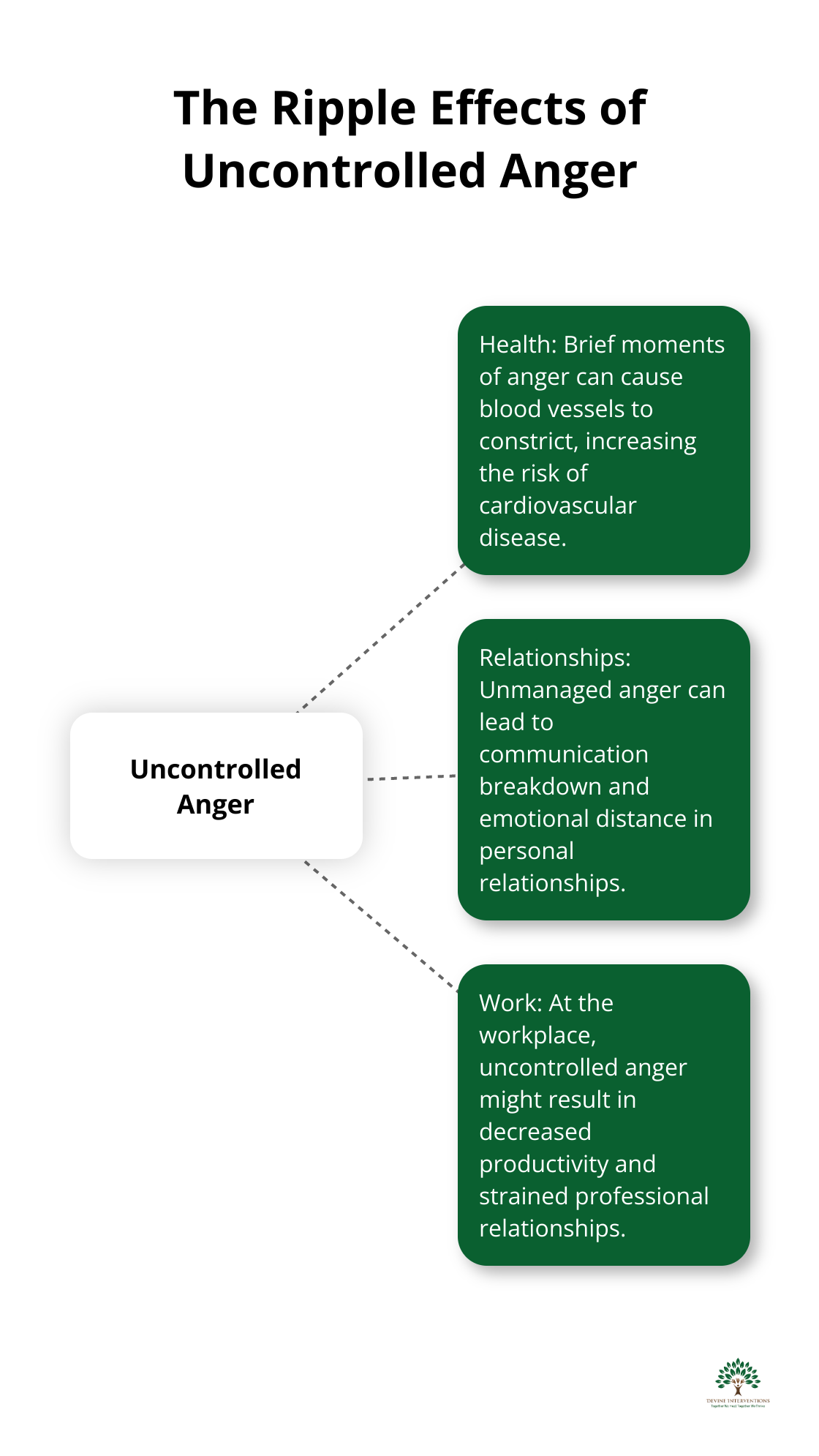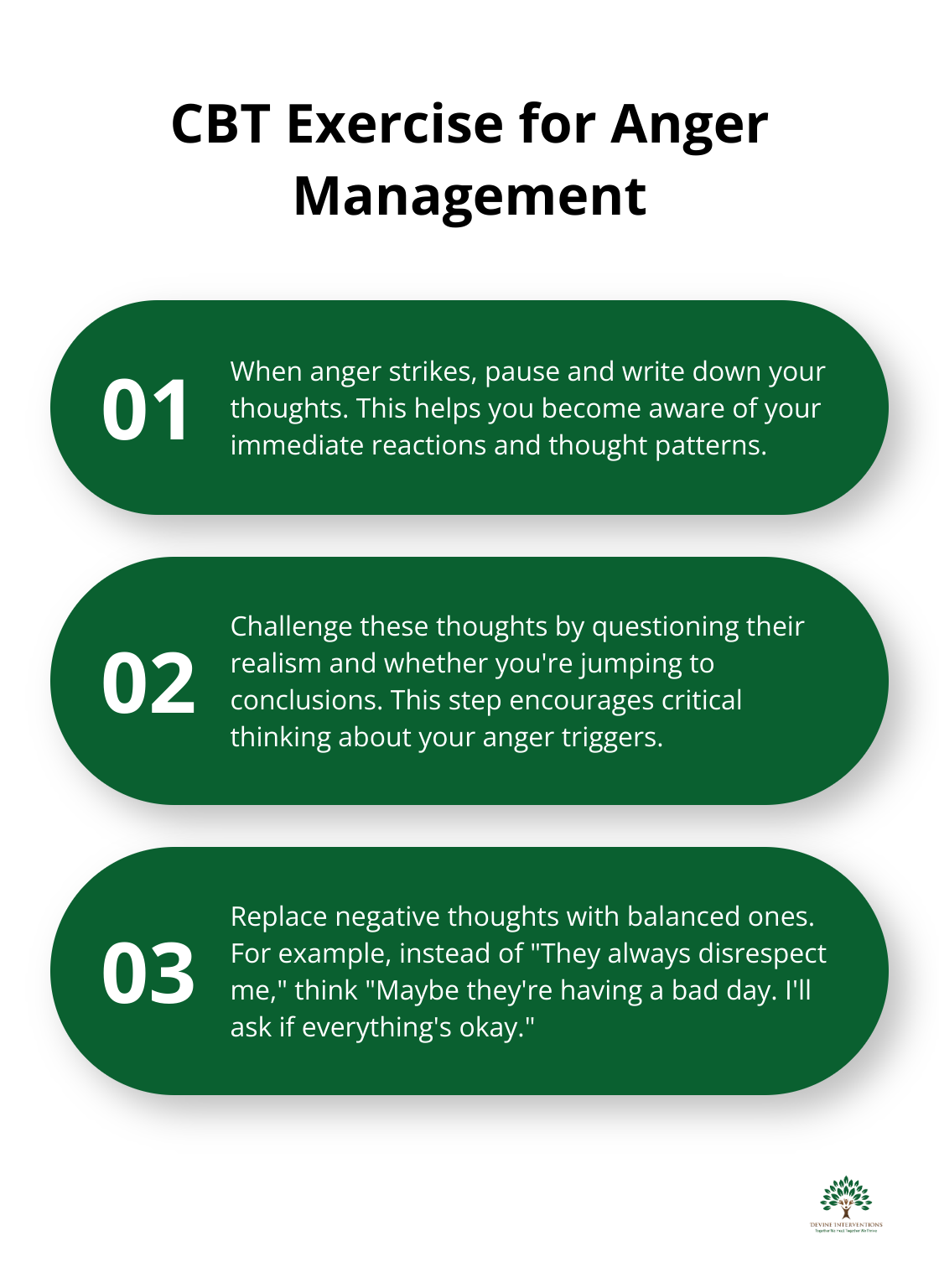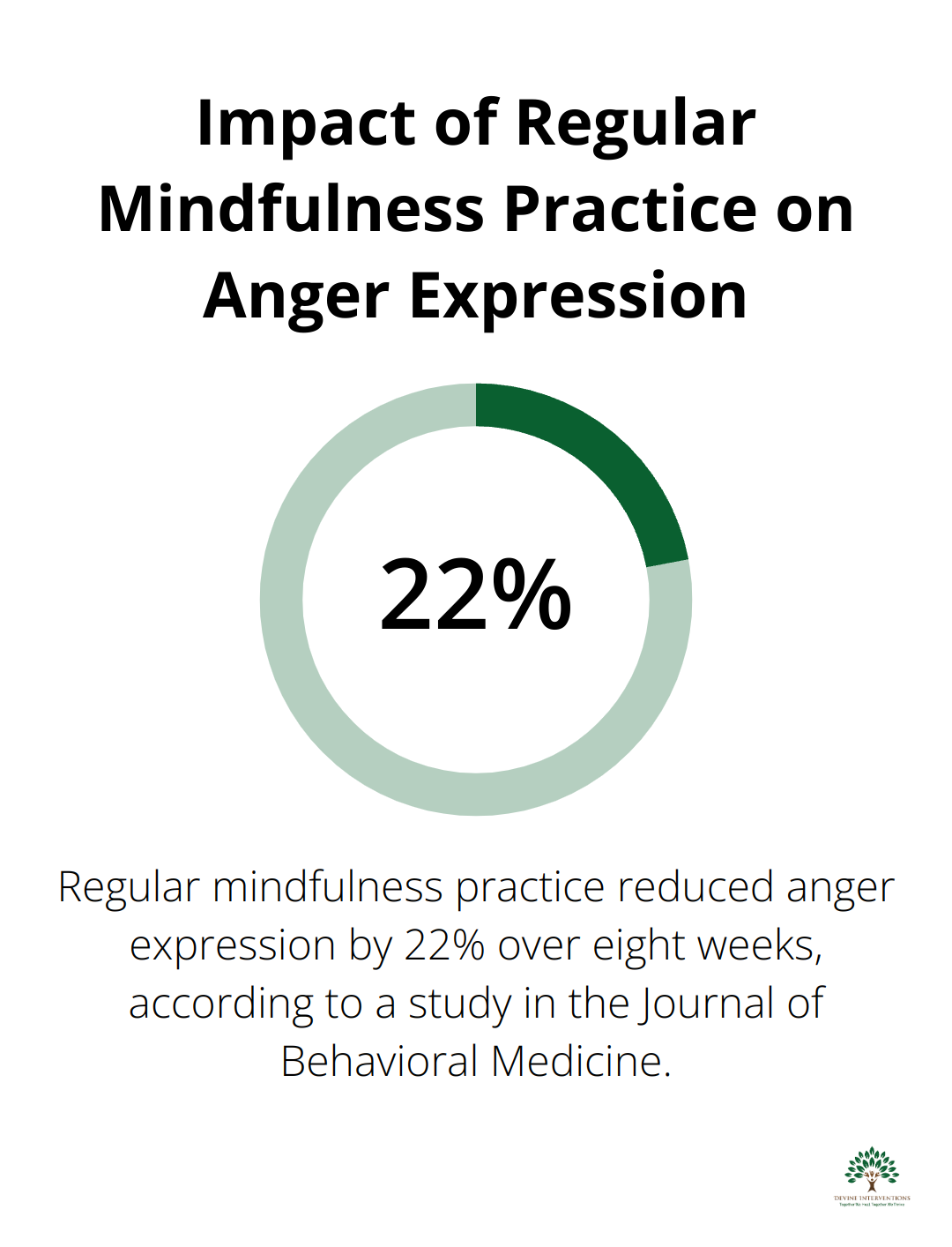Anger can be a challenging emotion to handle, often leaving us feeling overwhelmed and out of control. At Devine Interventions, we understand the impact unmanaged anger can have on your relationships, health, and overall well-being.
In this post, we’ll explore practical anger therapy techniques that seamlessly fit into your daily life. You’ll learn how to recognize triggers, develop coping strategies, and create a personalized plan for long-term anger management success.
What Fuels Your Anger?
The Many Faces of Anger
Anger isn’t a simple emotion – it’s a complex reaction that manifests in various ways. Some people experience explosive outbursts, while others simmer with resentment. You might feel irritable, frustrated, or even display passive-aggressive behavior. Recognizing your specific anger type is the first step towards effective management.
Uncovering Your Anger Triggers
Identifying what sets off your anger is vital. Common triggers include feeling disrespected, facing injustice, or experiencing stress. An anger journal can help you track your moods and reactions to identify your triggers. This simple exercise can reveal patterns you might not have noticed before.
The Ripple Effect of Uncontrolled Anger
Unmanaged anger doesn’t just affect you – it impacts everyone around you. Even brief moments of anger can cause your blood vessels to constrict, raising cardiovascular disease risk. In relationships, it can lead to communication breakdown and emotional distance. At work, it might result in decreased productivity and strained professional relationships.

The Path to Anger Management
Understanding your anger is the first step on the path to better emotional control. The next crucial phase involves learning and applying effective techniques to manage your anger. In the following section, we’ll explore practical strategies that you can easily incorporate into your daily routine, helping you take control of your emotions and improve your overall well-being.
Practical Tools for Taming Your Anger
Rewire Your Thoughts with CBT
Cognitive Behavioral Therapy (CBT) offers powerful techniques for anger management. It helps you identify and change negative thought patterns that fuel your anger. Try this simple CBT exercise:

For example, instead of “They always disrespect me,” think “Maybe they’re having a bad day. I’ll ask if everything’s okay.”
Calm Your Mind and Body
Mindfulness and relaxation exercises reduce anger intensity significantly. Recent research indicates that arousal-decreasing activities, such as mindfulness, can decrease anger and aggression. Use this quick mindfulness technique:
- Focus on your breath for 60 seconds.
- Notice any tension in your body and relax those areas.
- Observe your thoughts without judgment.
This simple exercise helps you regain control in heated moments.
Channel Your Energy Positively
Physical activity provides an excellent outlet for anger. A study in the Journal of Sport and Exercise Psychology found that exercise reduces anger and stress levels. Find an activity you enjoy (running, boxing, or even gardening). The key? Engage in it regularly, not just when anger strikes.
Personalize Your Approach
At Devine Interventions, we understand that one size doesn’t fit all when it comes to anger management. We provide personalized strategies tailored to your unique needs and lifestyle. Our approach combines these techniques with ongoing support to help you achieve lasting change.
Practice Makes Progress
Managing anger improves with consistent practice. Incorporate these tools into your daily routine to take significant steps towards better emotional control. As you master these techniques, you’ll find yourself better equipped to handle challenging situations.
The journey to effective anger management doesn’t end here. The next step involves creating a personalized plan that seamlessly fits into your life. Let’s explore how to build a sustainable anger management strategy that works for you.
How to Make Anger Management a Daily Habit
Start Your Day with Intention
Begin each morning with a five-minute mindfulness exercise. This practice sets a calm tone for the day and increases your awareness of potential triggers. A study published in the Journal of Behavioral Medicine found that regular mindfulness practice reduced anger expression by 22% over eight weeks.

Create Micro-Moments of Calm
Add brief relaxation techniques throughout your day. Try the 4-7-8 breathing method during your commute or between meetings. Inhale for 4 seconds, hold for 7, and exhale for 8. This technique activates your parasympathetic nervous system, reducing stress and anger responses.
Use Technology for Support
Anger management apps help track your moods and triggers. Apps like Calm Harm or Breathe2Relax offer quick exercises and reminders to stay centered. A recent study investigated the effects of mHealth apps designed to reduce stress and distress in non-clinical and clinical populations.
Build Your Support Network
Surround yourself with people who understand and support your anger management journey. Share your goals with trusted friends or family members. Consider joining a support group or working with a therapist for professional guidance and accountability.
Schedule Regular Check-Ins
Set aside time each week to reflect on your progress. Review your anger journal, noting patterns and improvements. This self-awareness is key for long-term success. Clients who maintain regular self-reflection often report feeling more in control of their emotions within just a few weeks.
Final Thoughts
Anger therapy empowers you to control your emotions and improve your life. You can transform your relationship with anger through consistent practice and personalized strategies. Our comprehensive approach at Devine Interventions includes specialized anger therapy services that integrate seamlessly into your daily routine.
We offer various treatment options to support your long-term emotional wellness. Our team of experienced professionals provides personalized strategies and ongoing support to help you achieve lasting change. We work together to develop an anger management plan that fits your life and builds a more balanced future.
If you seek additional support on your anger management journey, Devine Interventions stands ready to help. Taking control of your anger marks a powerful step towards better mental health and life quality. With patience, practice, and the right support, you can create positive change in your life.







